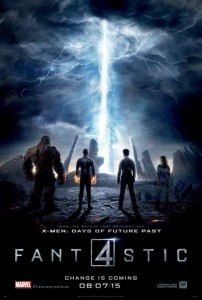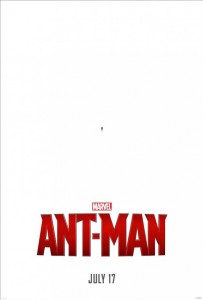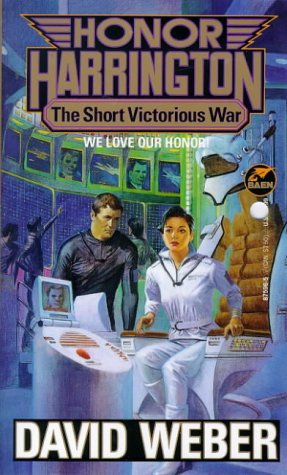 It’s been a while since I’ve read an Honor Harrington book, and I honestly couldn’t say why. I mean, I know why I haven’t in the past let’s say year and a half, what with finally packing up my house and moving, and then getting engaged and planning a wedding before getting my books all the way unpacked from the move. But it was four years before that, and that is the part I cannot especially account for. Honor books are fun! Step one: space bad guys decide to be bad guys. Step two: space good guys leave Honor in an untenable position due to political wrangling or misplaced tactical / strategic thought that notably disagrees with whatever Honor correctly thinks instead. Step three: big naval space battle, which is somehow exciting despite being spread out across hours and hours instead of the 15 minutes of a Star Wars space battle[1]. Step four: Honor wins and gets lots of begrudging accolades from the people she just proved wrong. What’s not to like?
It’s been a while since I’ve read an Honor Harrington book, and I honestly couldn’t say why. I mean, I know why I haven’t in the past let’s say year and a half, what with finally packing up my house and moving, and then getting engaged and planning a wedding before getting my books all the way unpacked from the move. But it was four years before that, and that is the part I cannot especially account for. Honor books are fun! Step one: space bad guys decide to be bad guys. Step two: space good guys leave Honor in an untenable position due to political wrangling or misplaced tactical / strategic thought that notably disagrees with whatever Honor correctly thinks instead. Step three: big naval space battle, which is somehow exciting despite being spread out across hours and hours instead of the 15 minutes of a Star Wars space battle[1]. Step four: Honor wins and gets lots of begrudging accolades from the people she just proved wrong. What’s not to like?
That said, this is the first book that has ended in such a way that I kind of want to know what happens next immediately. So while I understand not reading it that soon after the last one, I still can’t explain the fullness of the gap. Oh well?
Here’s what you need to know about The Short Victorious War: it is foreshadowed by a history lesson from which the title is drawn, in which Imperial Russia tried to take on Japan just a brief time before the glorious Communist revolution. So when the space bad guys proceed in chapter one to plan their own short, victorious war against the space good guys in order to settle down the proletariat, the outcome of the book has already been decided. However, getting there is basically hilarious on the space bad guy side[2] while maintaining the typically entertaining Honor formula on the space good guy side. Plus also, space romance!, if that kind of thing is your bag.
The reason I think I am especially excited for the next book is because it ended on the kind of cliffhanger that leads me to expect things to pick up weeks later instead of the typical years later, plus also I expect the formula to be broken. Which is always more exciting than knowing exactly what will happen, despite how entertaining the road to it might be.
[1] I think this is because of the ratcheting tension.
[2] Leader of the space bad guy revolutionaries is named, and I swear I am not making this up, Rob S. Pierre.
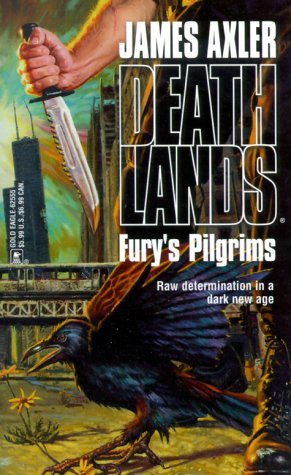 Did I mention that the Deathlands series is over, as of earlier this year? Probably. It’s just so weird to me that this thing has an ending, 30 years after it started. Especially when I compare to my infinite and infinitely expanding Marvel comics thing, you know? I mean, I’m still only to 1992 here, so it’s not like I’m in any danger of running out, it’s just strange.
Did I mention that the Deathlands series is over, as of earlier this year? Probably. It’s just so weird to me that this thing has an ending, 30 years after it started. Especially when I compare to my infinite and infinitely expanding Marvel comics thing, you know? I mean, I’m still only to 1992 here, so it’s not like I’m in any danger of running out, it’s just strange.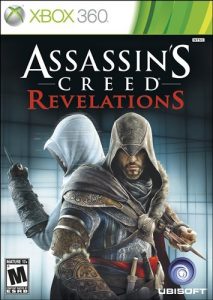 At long last, I’ve played another Assassin’s Creed game. I must be at least four behind now? And at some point they get terrible, though I do not know what point that is. Anyway,
At long last, I’ve played another Assassin’s Creed game. I must be at least four behind now? And at some point they get terrible, though I do not know what point that is. Anyway, 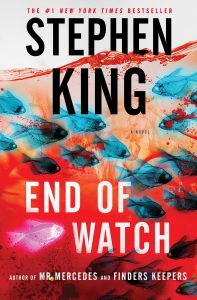 There was a time when I claimed that
There was a time when I claimed that 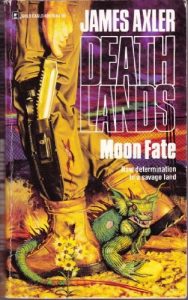 Apparently, the Deathlands series is completed, at 75 books, as of sometime last year. That’s kind of cool, because it implies that I might ever finish[1]. Not a habit I’m used to, what with Marvel comics that have been published continuously since 1961 with no end in sight.
Apparently, the Deathlands series is completed, at 75 books, as of sometime last year. That’s kind of cool, because it implies that I might ever finish[1]. Not a habit I’m used to, what with Marvel comics that have been published continuously since 1961 with no end in sight.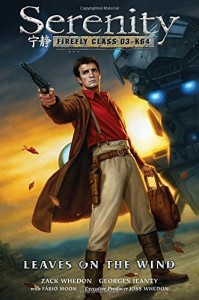 Until a credit card error combined with an email filing error caused me to miss several issues in a row (and I was already months behind on actually reading them even then), I collected Buffy and Angel comics set after those shows had ended. In addition to those, a handful of Firefly comics were released, but these were not of the full-sized sequel variety the others had been. A three issue follow-up story with only one spoiler of any consequence, and a second batch about which I, perhaps tragically, remember nothing (but it was past stories instead of future), and then by the time
Until a credit card error combined with an email filing error caused me to miss several issues in a row (and I was already months behind on actually reading them even then), I collected Buffy and Angel comics set after those shows had ended. In addition to those, a handful of Firefly comics were released, but these were not of the full-sized sequel variety the others had been. A three issue follow-up story with only one spoiler of any consequence, and a second batch about which I, perhaps tragically, remember nothing (but it was past stories instead of future), and then by the time 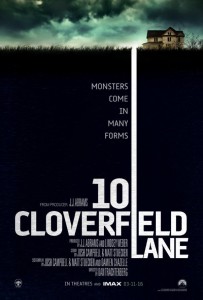 Friday was movie day, as occasionally comes around. And unexpectedly,
Friday was movie day, as occasionally comes around. And unexpectedly,  You know the drill by now. Some people trapped in a dystopic nightmare got tired of sending their kids off to the annual deathmatch, and once Jennifer Lawrence came along and showed them that the Capitol could be defied through the power of teamwork, they all came together to act on this new knowledge / long-standing grievance.
You know the drill by now. Some people trapped in a dystopic nightmare got tired of sending their kids off to the annual deathmatch, and once Jennifer Lawrence came along and showed them that the Capitol could be defied through the power of teamwork, they all came together to act on this new knowledge / long-standing grievance.